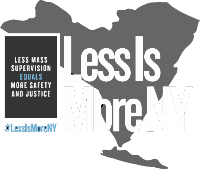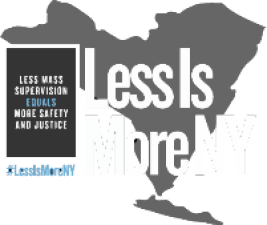FOR IMMEDIATE RELEASE:
Contact:
Yonah Zeitz, yzeitz@katalcenter.org | (347) 201-2768
Yan Snead, ysnead@katalcenter.org | (518) 360-1534
Follow online: #LessIsMoreNY www.lessismoreny.org
#LessIsMoreNY Campaign Testifies at Assembly Health and Addiction Committee’s Hearing on the Impact of COVID-19 on People Struggling with Substance Use in New York
New York State Reincarcerates More People on Parole to Receive “Drug Treatment” Than All Other States Combined
Directly Impacted People, Constituents, and Community Groups Demand Legislature Pass #LessIsMoreNY Act Immediately to End this Cycle & Decarcerate Jails and Prisons
New York, NY – Yesterday, the New York Assembly Standing Committee on Alcoholism and Substance Abuse and the Assembly Standing Committee on Health held a joint public hearing regarding the impact of COVID-19 on people struggling with substance use in New York. The #LessIsMoreNY Campaign testified to demand passage of the #LessIsMoreNY Act, highlighting that in the midst of COVID-19, people on parole are being sent back to prison for “drug treatment” instead of being provided access to such treatment in the community where they belong. That the Cuomo Administration is doing this at all is unacceptable, but to do so during a pandemic is simply outrageous.
The parole system in New York has become a major contributor to mass incarceration. Nearly 1/3 of the new admissions to New York state prisons are due to people re-incarcerated for technical violations of parole, like missing a curfew or failing an alcohol test. Recently released data from the Bureau of Justice Statistics on people exiting parole reaffirms that New York is second in the nation, behind only Illinois, for incarcerating people for non-criminal technical violations of parole. In 2018 alone, New York sent 5,783 people to jail and prison for technical violations of parole.
The Bureau of Justice Statistics data also show that New York sends more people on parole back to prison for “drug treatment” than all other states combined. In 2018, New York sent 1,648 people to jail or prison for drug treatment. There is near universal agreement among health officials that incarceration is not an effective approach to the health problem of drug use or addiction. Yet, New York remains an outlier among states across the country in incarcerating thousands of people a year to receive drug treatment, a practice that disproportionately impacts Black and brown New Yorkers. Not only is this practice ineffective, it is dangerous as jails and prisons are notorious incubators of contagions due to close quarters and unsanitary conditions. This practice puts New Yorkers who are experiencing substance misuse while on parole at life threatening risk of COVID-19.
In March, as the COVID-19 crisis in jails and prisons intensified, community groups pressured Governor Cuomo to acknowledge the immoral and impractical decision to incarcerate people for technical violations of parole and he responded by planning to release up to 1,100 individuals held in local jails for technical violations of parole. However, this did not happen fast enough as Raymond Rivera, the second individual to pass away on Rikers Island due to COVID-19, was their solely for leaving a drug program. Since that announcement, New York continues to incarcerate people for technical violations of parole and DOCCS has once again begun to increase the number of people sent to county jails for these violations, many of whom are there because of addiction and substance use. A report from the Columbia Justice Lab in late May showed that two months after Gov. Cuomo’s announcement, more than 160 new people accused of technical parole violations were sent to the Rikers jails by DOCCS and those numbers are continuing to rise.
It is clear that incarceration is never an appropriate response to addiction and substance use; and incarceration during a pandemic is even more inhumane. Legislative action is urgently needed to fix this problem. The #LessIsMoreNY Act (Less Is More: Community Supervision Revocation Reform Act (S.1343C – Benjamin / A.5493B – Mosley)) would fix this problem. We urge the legislature to immediately pass the #LessIsMoreNY Act to ensure that people on parole who want drug treatment can access it in the community instead of being sent back to prison for “treatment”.
Statements by Directly Impacted People and Groups Calling for Passage of the #LessIsMoreNY Act
Derek Singletary, Co-Founder and Co-Executive Director of Unchained, said: “It is ludicrous that New York State returns more than 1,500 people on parole to prison each year under the guise of receiving substance use treatment. Experts and the general public now widely recognize substance use as a public health issue, not a crime issue, and yet New York State, which touts itself as one of the most progressive states in the nation, continues to routinely use drug testing as a method to criminalize and re-incarcerate people on parole. Further, parole officers are not qualified to assess which people may require treatment for substance use and which people may be using substances recreationally without a negative impact on their lives. People in need of treatment can and should receive it safely in their own community, not behind bars where they are removed from their families, jobs, housing, and schools. The New York State Legislature must pass the Less is More Act to end this racist, ineffective, and harmful practice.”
Donna Hylton, Founder and President of A Little Piece of Light, said: “As the country continues to grapple with COVID-19, New York continues to put residents at risk by sending them back to incarceration for “drug treatment”. Correctional settings are notorious for spreading viruses, and this practice is put thousands of New Yorkers at risk for catching, and getting sick from, COVID-19. Women in our state prisons and jails are uniquely impacted by this, given the lack of adequate resources for them while they are incarcerated. Even more disturbing, there are thousands sitting in prisons and jails across the country due to technical parole violations, like testing positive for drugs. The legislature needs to pass #LessIsMoreNY immediately and stop this harmful practice of sending people back to incarceration in the midst of a pandemic, and beyond.”
Marilyn G., Member of the Katal Center, said: “As a Licensed Clinical Social Worker and Substance Abuse Clinician, I see the impact reincareration has on people with very minor infractions while they are on parole, like using substances. It’s not productive for the individual to go back to incarceration and it negatively impacts the family, and the community at large, when people are routinely incarcerated. In the current environment, it is egregious for people to continually be incarcerated for minor technical infractions during the pandemic. This is why we support #LessIsMoreNY to ensure that people aren’t reincarcerated for technical parole violations.”
Tyler Nims, Executive Director of the Independent Commission on NYC Criminal Justice & Incarceration Reform, said: “If it wasn’t clear before the dangers of COVID-19, the demands for racial justice following the killings of George Floyd and others, and the devastating economic crisis that is hitting our State and local governments, it should be clear now: spending hundreds of millions of dollars each year to lock people up for technical violations of parole conditions – like testing positive for a controlled substance – is bad policy, bad law, and an enormous waste of money. Let’s pass the Less Is More Act as soon as possible and make New York State a leader in criminal justice.”
###
About the Less is More NY Campaign:
The Less is More NY Campaign is a coalition of groups working to pass the Less is More: Community Supervision Revocation Reform Act (S.1343C – Benjamin / A.5493B – Mosley), developed by people on parole, people currently incarcerated, family members, and groups across New York. Passing this bill would be an important step in the fight to end mass incarceration and mass supervision by restricting the use of incarceration in response to parole violations and promoting early discharge from community supervision. For more information visit: www.lessismoreny.org.

